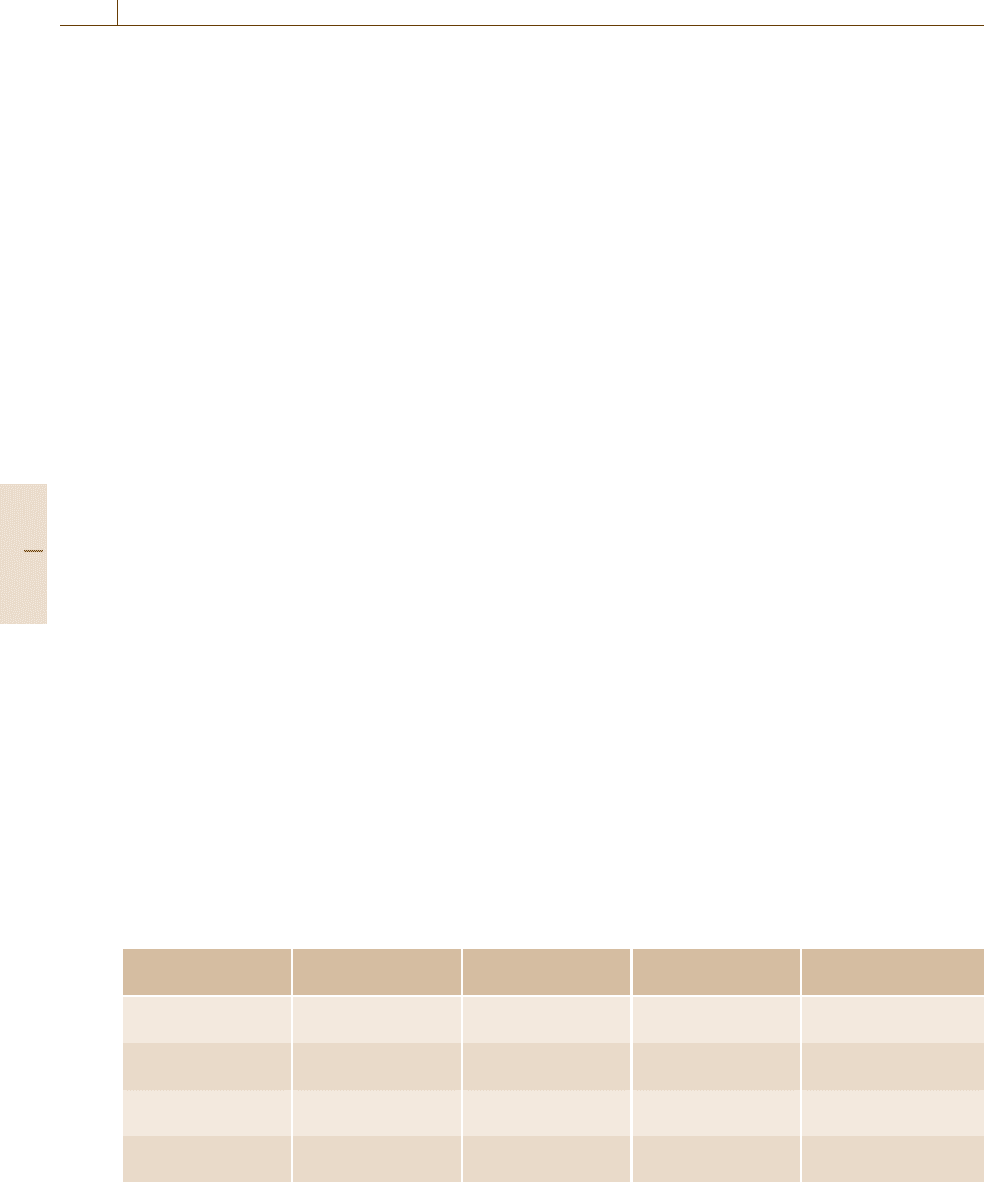Nof S.Y. Springer Handbook of Automation
Подождите немного. Документ загружается.


Cybernetics and Learning Automata 12.4 Classification of Learning Automata 225
In (12.6), each element f
β
ij
of the matrix F
β
represents
the probability of the automaton moving from state q
i
to the state q
j
on receiving an input signal β from the
RE. F
β
is a Markov matrix, and hence
s
j=1
f
β
ij
=1 , where β ∈ B;i =1, 2,...,s .
(12.7)
Similarly, in a stochastic automaton, if G(·) is stochas-
tic, we have
g
ij
=Pr{α(t) =α
j
|q(t) =q
i
}, i, j =1, 2,...,s ,
(12.8)
where g
ij
represents the elements of the conditional
probability matrix of dimension s×r. Intuitively, g
ij
de-
notes the probability that, when the automaton is in
state q
i
, it chooses the action α
j
.Asin(12.7), we
have
r
j=1
g
ij
=1 , for each row i = 1, 2,...,s . (12.9)
Fixed Structure Learning Automata
In a stochastic LA, if the conditional probabilities f
β
ij
and g
ij
are constant, i. e., they do not vary with the
time step t and the input sequence, the automaton is
termed a fixed structure stochastic automaton (FSSA).
The popular examples of these types of automata were
proposed by Tsetlin [12.1, 2], Krylov [12.26], and
Krinsky [12.27] – all of which are -optimal. Their de-
tails can be found in [12.3].
Variable Structure Learning Automata
Unlike the FSSA, variable structure stochastic au-
tomata (VSSA) are those in which the state transition
probabilities are not fixed. In such automata, the state
transitions or the action probabilities themselves are up-
dated at every time instant using a suitable scheme.
The transition probabilities f
β
ij
and the output func-
tion g
ij
vary with time, and the action probabilities
are updated on the basis of the input. These au-
tomata are discussed here in the context of linear
schemes, but the concepts discussed below can be ex-
tended to nonlinear updating schemes as well. The
types of automata that update transition probabilities
with time were introduced in 1963 by Varshavskii and
Vorontsova [12.6]. A VSSA depends on a random-
number generator for its implementation. The action
chosen is dependent on the action probability distri-
bution vector, which is, in turn, updated based on the
reward/penalty input that the automaton receives from
the RE.
Definition 12.6
A VSSA is a quintuple Q, A, B, T, where Q rep-
resents the different states of the automaton, A is
the set of actions, B is the set of responses from
the environment to the LA, G is the output func-
tion, and T is the action probability updating scheme
T :[0, 1]
r
× A× B →[0, 1]
r
, such that
P(t +1) = T[P(t),α(t),β(t)],
(12.10)
where P(t) is the action probability vector.
Normally, VSSA involve the updating of both the
state and action probabilities. For the sake of simplic-
ity, in practice, it is assumed that in such automata, each
state corresponds to a distinct action, in which case the
action transition mapping G becomes the identity map-
ping, and the number of states, s, is equal to the number
of actions, r (s =r < ∞).
VSSA can be analyzed using a discrete-time
Markov process, defined on a suitable set of states.
If a probability updating scheme T is time invariant,
{P(t)}
t≥0
is a discrete-homogenous Markov process,
and the probability vector at the current time instant
P(t) (along with α(t)andβ(t)) completely determines
P(t +1). Hence, each distinct updating scheme, T,
identifies a different type of learning algorithm, as fol-
lows:
•
Absorbing algorithms are those in which the updat-
ing scheme, T, is chosen in such a manner that the
Markov process has absorbing states;
•
Nonabsorbing algorithms are those in which the
Markov process has no absorbing states;
•
Linear algorithms are those in which P(t +1) is
a linear function of P(t);
•
Nonlinear algorithms are those in which P(t +1) is
a nonlinear function of P(t).
In a VSSA, if a chosen action α
i
is rewarded, the
probability for the current action is increased, and the
probabilities for all other actions are decreased. On the
other hand, if the chosen action α
i
is penalized, the
probability of the current action is decreased, whereas
the probabilities for the rest of the actions could, typi-
cally, be increased. This leads to the following different
types of learning schemes for VSSA:
Part B 12.4

226 Part B Automation Theory and Scientific Foundations
•
Reward–penalty (RP): In both cases, i.e., when
the automaton is rewarded as well as penalized, the
action probabilities are updated;
•
Inaction–penalty (IP): When the automaton is pe-
nalized the action probability vector is updated,
whereas when the automaton is rewarded the action
probabilities are neither increased nor decreased;
•
Reward–inaction (RI): The action probability vec-
tor is updated whenever the automaton is rewarded,
and is unchanged whenever the automaton is penal-
ized.
A LA is considered to be a continuous automaton if
the probability updating scheme T is continuous, i.e.,
the probability of choosing an action can be any real
number in the closed interval [0, 1].
In a VSSA, if there are r actions operating in a sta-
tionary environment with β ={0, 1}, a general action
probability updating scheme for a continuous automa-
ton is described below. We assume that the action α
i
is
chosen, and thus, α(t) =α
i
. The updated action proba-
bilities can be specified as
for β(t) =0 , ∀j =i , p
j
(t +1) = p
j
(t)−g
j
[P(t)],
for β(t) =1 , ∀j = i , p
j
(t +1) = p
j
(t)+h
j
[P(t)].
(12.11)
Since P(t) is a probability vector,
(
r
j=1
p
j
(t) =1.
Therefore,
when β(t) =0 ,
p
i
(t +1) = p
i
(t)+
r
j=1, j=i
g
j
[P(t)],
and when β(t) =1 ,
p
i
(t +1) = p
i
(t)−
r
j=1, j=i
h
j
[P(t)]. (12.12)
Table 12.1 Properties of the continuous learning schemes
Learning Learning Usefulness Optimality Ergodic/absorbing
scheme parameters (good/bad) (when useful)
L
RI
a > 0, Good -optimal Absorbing
b =0 as a →0 (stationary E)
L
IP
a =0, Ver y b ad Not even Ergodic
b > 0 expedient (nonstationary E)
L
RP
a =b, Bad Never Ergodic
(symmetric) a, b > 0 -optimal (nonstationary E)
L
R− P
a > 0, Good -optimal Ergodic
b a as a →0 (nonstationary E)
The functions h
j
and g
j
are nonnegative andcontinuous
in [0, 1], and obey
∀i = 1, 2,...,r , ∀P ∈ (0, 1)
R
,
0 < g
j
(P) < p
j
, and
0 <
r
j=1, j=i
[p
j
+h
j
(P)]< 1 . (12.13)
For continuous linear VSSA, the following four learn-
ing schemes are extensively studied in the literature.
They are explained for the two-action case; their exten-
siontother-action case, wherer > 2, is straightforward
and can be found in [12.3]. The four learning schemes
are:
•
The linear reward–inaction scheme (L
RI
)
•
The linear inaction–penalty scheme (L
IP
)
•
The symmetric linear reward–penalty scheme
(L
RP
)
•
The linear reward– -penalty scheme (L
R− P
).
For a two-action LA,let
g
i
[P(t)]=ap
j
(t)and
h
j
[P(t)]=b(1− p
j
(t)) . (12.14)
In (12.14), a and b are called the reward and penalty
parameters, and they obey the following inequalities:
0 < a < 1, 0 ≤b < 1. Equation (12.14) will be used
further to develop the action probability updating equa-
tions. The above-mentioned linear schemes are quite
popular in LA because of their analytical tractability.
They exhibit significantly different characteristics, as
can be seen in Table 12.1.
The L
RI
scheme was first introduced by Nor-
man [12.28], and then studied by Shapiro and Naren-
dra [12.29]. It is based on the principle that, whenever
the automaton receives a favorable response (i.e., re-
ward) from the environment, the action probabilities are
Part B 12.4

Cybernetics and Learning Automata 12.4 Classification of Learning Automata 227
updated in alinear manner,whereas ifthe automatonre-
ceives an unfavorable response (i.e., penalty) from the
environment, they are unaltered.
The probability updating equations for this scheme
can be simplified to
p
1
(t +1) = p
1
(t)+a[1− p
1
(t)],
if α(t) =α
1
, and β(t) =0 ,
p
1
(t +1) =(1−a)p
1
(t) ,
if α(t) =α
2
, and β(t) =0 ,
p
1
(t +1) = p
1
(t) ,
if α(t) =α
1
or α
2
, and β(t) =1 . (12.15)
We see that, if action α
i
is chosen, and a reward is re-
ceived, the probability p
i
(t) is increased, and the other
probability p
j
(t)(i.e.,j =i) is decreased. Ifeither α
1
or
α
2
is chosen,and a penaltyis received, P(t) is unaltered.
Equation (12.15) shows that the L
RI
scheme has the
vectors [1, 0]
and [0, 1]
as two absorbing states. In-
deed, with probability 1, it gets absorbed into one of
these absorbing states. Therefore, the convergence of
the L
RI
scheme is dependent on the nature of the initial
conditions and probabilities. The scheme is not suitable
for nonstationary environments. On the other hand, for
stationary random environments, the L
RI
scheme is both
absolutely expedient, and -optimal [12.3].
The L
IP
and L
RP
schemes are devised similarly, and
are omitted from further discussions. They, and their
respective analysis, can be found in [12.3].
The so-calledsymmetry conditions for the functions
g(·)andh(·) to lead to absolutely expedient LA are also
derived in [12.3,8].
Table 12.2 Properties of the discretized learning schemes
Learning Learning Usefulness Optimality Ergodic/absorbing
scheme parameters (good/bad) (as N →∞) (when useful)
DL
RI
N > 0 Good -optimal Absorbing
(stationary E)
DL
IP
N > 0 Ve ry b ad Expedient Ergodic
(nonstationary E)
ADL
IP
N > 0 Good, sluggish -optimal Artificially absorbing
(stationary environments)
DL
RP
N > 0 Reasonable -optimal Ergodic
if c
min
< 0.5 (nonstationary E)
ADL
RP
N > 0 Good -optimal Artificially absorbing
(stationary E)
MDL
RP
N > 0 Good -optimal Ergodic
(nonstationary E)
Discretized Learning Automata
The VSSA algorithms presented in Sect. 12.4.2 are con-
tinuous, i.e., the action probabilities can assume any
real value in the interval [0, 1].InLA, the choice of
an action is determined by a random-number generator
(RNG). In order to increase the speed of convergence
of these automata, Thathachar and Oommen [12.30]
introduced the discretized algorithms for VSSA,in
which they suggested the discretization of the prob-
ability space. The different properties (absorbing and
ergodic) of these learning automata, and the updating
schemes of action probabilities for these discretized au-
tomata (like their continuous counterparts), were later
studied in detail by Oommen et al. [12.31–34].
Discretized automata can be perceived to be some-
what like a hybrid combination of FSSA and VSSA.
Discretization is conceptualized by restricting the prob-
ability of choosing the actions to only a fixed number
of values in the closed interval [0, 1]. Thus, the updat-
ing of the action probabilities is achieved in steps rather
than in a continuous manner as in the case of contin-
uous VSSA. Evidently, like FSSA, they possess finite
sets, but because they have action probability vectors
which are random vectors, they behave like VSSA.
Discretized LA can also be of two types:
(i) Linear – in which case the action probability values
are uniformly spaced in the closed interval [0, 1]
(ii) Nonlinear – in which case the probability values are
unequally spaced in the interval [0, 1] [12.30, 32–
34].
Perhaps the greatest motivation behind discretiza-
tion is overcoming the persistent limitation of con-
Part B 12.4

228 Part B Automation Theory and Scientific Foundations
tinuous learning automata, i. e., the slow rate of
convergence. This is achieved by narrowing the un-
derlying assumptions of the automata. Originally, the
assumption was that the RNGs could generate real val-
ues with arbitrary precision. In the case of discretized
LA, if an action probability is reasonably close to unity,
the probability of choosing that action increases to unity
(when the conditions are appropriate) directly, rather
than asymptotically [12.30–34].
The second important advantage of discretization is
that it is more practical in the sense that the RNGsused
by continuous VSSA can only theoretically be assumed
to adopt any value in the interval [0, 1], whereas almost
all machine implementations of RNGs use pseudo-
RNGs. Inother words,the setof possible random values
is not infinite in [0, 1], but finite.
Last, but not the least, discretization is also im-
portant in terms of implementation and representation.
Discretized implementations of automata use integers
for tracking the number of multiples of 1/N of the ac-
tion probabilities, where N is the so-called resolution
parameter. This not only increases the rate of conver-
gence of the algorithm, but also reduces the time, in
terms of the clock cycles it takes for the processor to do
each iteration of the task, and the memory needed. Dis-
cretized algorithms have been proven to be both more
time and space efficient than the continuous algorithms.
Similar to the continuous LA paradigm, the dis-
cretized versions, the DL
RI
, DL
IP
,andDL
RP
automata,
have also been reported. Their design, analysis, and
properties are given in [12.30,32–34], and are summa-
rized in Table 12.2.
12.5 Estimator Algorithms
12.5.1 Rationale and Motivation
As we have seen so far, the rate of convergence of
learning algorithms is one of the most important con-
siderations, which was the primary reason for designing
the family of discretized algorithms. With the same
goal Thathachar and Sastry designed a new-class of al-
gorithms, called the estimator algorithms [12.35–38],
which have faster rate of convergence than all the previ-
ous families. These algorithms, like the previous ones,
maintain and update an action probability vector. How-
ever, unlike the previous ones, these algorithms also
keep running estimates for each action that is rewarded,
using a reward–estimate vector, and then use those esti-
mates in the probability updating equations. The reward
estimates vector is, typically, denoted in the literature
by
ˆ
D(t) =[
ˆ
d
1
(t),...,
ˆ
d
r
(t)]
. The corresponding state
vector is denoted by Q(t) =P(t),
ˆ
D(t).
In a random environment, these algorithms help
in choosing an action by increasing the confidence in
the reward capabilities of the different actions; for ex-
ample, these algorithms initially process each action
a number of times, and then (in one version) could
increase the probability of the action with the high-
est reward estimate [12.39]. This leads to a scheme
with better accuracy in choosing the correct action.
The previous nonestimatorVSSA algorithms updatethe
probability vector directly on the basis of the response
of the environment to the automaton, where, depend-
ing on the type of vector updating scheme being used,
the probability of choosing a rewarded action in the
subsequent time instant is increased, and the probabili-
ties of choosing the other actions could be decreased.
However, estimator algorithms update the probability
vector based on both the estimate vector and the current
feedback provided by the environment to the automa-
ton. The environment influences the probability vector
both directly and indirectly, the latter being as a re-
sult of the estimation of the reward estimates of the
different actions. This may, thus, lead to increases in ac-
tion probabilities different from the currently rewarded
action.
Even though there is an added computational cost
involved in maintaining the reward estimates, these es-
timator algorithms have an order of magnitude superior
performance than the nonestimator algorithms previ-
ously introduced. Lanctôt and Oommen [12.31]further
introduced the discretizedversionsof theseestimator al-
gorithms, which were proven to have an even faster rate
of convergence.
12.5.2 Continuous Estimator Algorithms
Thathachar and Sastry introduced the class of con-
tinuous estimator algorithms [12.35–38]inwhichthe
probability updating scheme T is continuous, i.e., the
probability of choosing an action can be any real
number in the closed interval [0, 1]. As mentioned sub-
sequently, the discretized versions of these algorithms
were introduced by Oommen and his co-authors, Lanc-
Part B 12.5

Cybernetics and Learning Automata 12.5 Estimator Algorithms 229
tôt and Agache [12.31,40]. These algorithms are briefly
explained in Sect.12.5.3.
Pursuit Algorithm
The family of pursuit algorithms is a class of estima-
tor algorithms that pursue an action that the automaton
currently perceives to be the optimal one. The first pur-
suit algorithm, called the CP
RP
algorithm, introduced
by Thathachar and Sastry [12.36, 41], pursues the op-
timal action by changing the probability of the current
optimal action whether it receives a reward or a penalty
by the environment. In this case, the currently perceived
best action is rewarded, and its action probability value
is increased with a value directly proportional to its
distance to unity, namely 1− p
m
(t), whereas the less
optimal actions are penalized, and their probabilities
decreased proportionally.
To start with, based on the probability distribution
P(t), the algorithm chooses an action α(t). Whether
the response was a reward or a penalty, it increases
that component of P(t) which has the maximal current
reward estimate, and it decreases the probability corre-
sponding to the rest of the actions. Finally, the algorithm
updates the running estimates of the reward probabil-
ity of the action chosen, this being the principal idea
behind keeping, and using, the running estimates. The
estimate vector
ˆ
D(t) can be computed using the fol-
lowing formula which yields the maximum-likelihood
estimate
ˆ
d
i
(t) =
W
i
(t)
Z
i
(t)
, ∀i = 1, 2,...,r ,
(12.16)
where W
i
(t) is the number of times the action α
i
has
been rewarded until the current time t,andZ
i
(t)isthe
number of times α
i
has been chosen until the current
time t. Based on the above concepts, the CP
RP
algo-
rithm is formally given in [12.31,39,40].
The algorithm is similar in principle to the L
RP
al-
gorithm, because both the CP
RP
and the L
RP
algorithms
increase/decrease the action probabilities of the vector,
independent of whether the environment responds to
the automaton with a reward or a penalty. The major
differencelies in the way the reward estimates are main-
tained, used, and are updated on both reward/penalty. It
should be emphasized that, whereas the nonpursuit al-
gorithm moves the probability vector in the direction
of the most recently rewarded action, the pursuit algo-
rithm moves the probability vector in the direction of
the action with the highest reward estimate. Thathachar
and Sastry [12.41] have theoretically proven their -
optimality, and experimentally proven that these pursuit
algorithms are more accurate, and several orders of
magnitude faster than the nonpursuit algorithms.
The reward–inaction version of this pursuit al-
gorithm is also similar in design, and is described
in [12.31, 40]. Other pursuit-like estimator schemes
have also been devised and can be found in [12.40].
TSE Algorithm
A more advanced estimator algorithm, which we refer
to as the TSE algorithm to maintain consistency with
the existing literature [12.31, 39,40], was designed by
Thathachar and Sastry [12.37,38].
Like the other estimator algorithms, the TSE al-
gorithm maintains the running reward estimates vector
ˆ
D(t) and uses it to calculate the action probability vec-
tor P(t). When an action α
i
(t) is rewarded, according
to the TSE algorithm, the probability components with
a reward estimate greater than
ˆ
d
i
(t) are treated differ-
ently from those components with a value lower than
ˆ
d
i
(t). The algorithm does so by increasing the proba-
bilities for all the actions that have a higher estimate
than the estimate of the chosen action, and decreasing
the probabilities of all the actions with a lower esti-
mate. This is done with the help of an indicator function
S
ij
(t) which assumes the value 1 if
ˆ
d
i
(t) >
ˆ
d
j
(t)and
the value 0 if
ˆ
d
i
(t) ≤
ˆ
d
j
(t). Thus, the TSE algorithm
uses both the probability vector P(t) and the reward
estimates vector
ˆ
D(t) to update the action probabili-
ties. The algorithm is formally described in [12.39]. On
careful inspection of the algorithm, it can be observed
that P(t +1) depends indirectly on the response of the
environment to the automaton. The feedback from the
environment changes the values of the components of
ˆ
D(t), which, in turn, affects the values of the functions
f(·)andS
ij
(t) [12.31,37–39].
Analyzing the algorithm carefully, we obtain three
cases. If the i-th action is rewarded, the probability val-
ues of the actions with reward estimates higher than
the reward estimate of the currently selected action are
updated using [12.37]
p
j
(t +1)
= p
j
(t)−λ
f
ˆ
d
i
(t)−
ˆ
d
j
(t)
[p
i
(t)− p
j
(t)p
i
(t)]
r −1
;
(12.17)
when
ˆ
d
i
(t) <
ˆ
d
j
(t), since the function f
ˆ
d
i
(t)−
ˆ
d
j
(t)
is monotonic and increasing, f
ˆ
d
i
(t)−
ˆ
d
j
(t)
is seen to
be negative. This leads to a higher value of p
j
(t +1)
than that of p
j
(t), which indicates that the probabil-
ity of choosing actions that have estimates greater than
Part B 12.5

230 Part B Automation Theory and Scientific Foundations
that of the estimates of the currently chosen action will
increase.
For all the actions with reward estimates smaller
than the estimate of the currently selected action, the
probabilities are updated based on
p
j
(t +1) = p
j
(t)−λ f
ˆ
d
i
(t)−
ˆ
d
j
(t)
p
j
(t) . (12.18)
The sign of the function f
ˆ
d
i
(t)−
ˆ
d
j
(t)
is negative,
which indicates that the probability of choosing actions
that have estimates less than that of the estimate of the
currently chosen action will decrease.
Thathachar and Sastry have proven that the TSE
algorithm is -optimal [12.37]. They have also experi-
mentally shown that the TSE algorithm often converges
several orders of magnitude faster than the L
RI
scheme.
Generalized Pursuit Algorithm
Agache and Oommen [12.40] proposed a generalized
version of the pursuit algorithm (CP
RP
) proposed by
Thathachar and Sastry [12.36, 41]. Their algorithm,
called the generalized pursuit algorithm (GPA), gen-
eralizes Thathachar and Sastry’s pursuit algorithm by
pursuing all those actions that possess higher reward
estimates than the chosen action. In this way the proba-
bility of choosing a wrong action is minimized. Agache
and Oommen experimentally compared their pursuit al-
gorithm with the existing algorithms, and found that
their algorithm is the best in terms of the rate of
convergence [12.40].
In the CP
RP
algorithm, the probability of the
best estimated action is maximized by first decreas-
ing the probability of all the actions in the following
manner [12.40]
p
j
(t +1) =(1−λ)p
j
(t) , j = 1, 2,...,r .
(12.19)
The sum of the action probabilities is made unity
by the help of the probability mass Δ, which is given
by [12.40]
Δ =1−
r
j=1
p
j
(t +1) =1−
r
j=1
(1−λ)p
j
(t)
=1−
r
j=1
p
j
(t)+λ
r
j=1
p
j
(t) =λ. (12.20)
Thereafter, the probability mass Δ is added to the prob-
ability of the best estimated action. The GPA algorithm,
thus, equidistributes the probability mass Δ to the ac-
tion estimated to be superior to the chosen action. This
gives us [12.40]
p
m
(t +1) =(1−λ)p
m
(t)+Δ = (1−λ)p
m
(t)+λ,
(12.21)
where
ˆ
d
m
= max
j=1,2,...,r
ˆ
d
j
(t)
. Thus, the updating
scheme is given by [12.40]
p
j
(t +1) =(1−λ)p
j
(t)+
λ
K(t)
,
if
ˆ
d
j
(t) >
ˆ
d
i
(t) , j =i ,
p
j
(t +1) =(1−λ)p
j
(t) ,
if
ˆ
d
j
(t) ≤
ˆ
d
i
(t) , j =i ,
p
i
(t +1) =1−
j=i
p
j
(t +1) , (12.22)
where K(t) denotesthe number of actions that have esti-
mates greaterthan theestimate ofthe reward probability
of the action currently chosen. The formal algorithm is
omitted, but can be found in [12.40].
12.5.3 Discrete Estimator Algorithms
As we have seen so far, discretized LA are superior to
their continuous counterparts, and the estimator algo-
rithms are superior to the nonestimator algorithms in
terms of the rate of convergence of the learning algo-
rithms. Utilizing the previously proven capabilities of
discretization in improving the speed of convergence of
the learning algorithms, Lanctôt and Oommen [12.31]
enhanced the pursuit and the TSE algorithms. This
led to the designing of classes of learning algorithms,
referred to in the literature as the discrete estimator al-
gorithms (DEA) [12.31]. To this end, as done in the
previous discrete algorithms, the components of the ac-
tion probability vector are allowed to assume a finite set
of discrete values in the closed interval [0, 1], which is,
in turn, divided into a number of subintervals propor-
tional to the resolution parameter N. Along with this,
a reward estimate vector is maintained to keep an esti-
mate of the reward probability of each action [12.31].
Lanctôt and Oommen showed that, for each mem-
ber algorithm belonging to the class of DEAstobe
-optimal, it must possess a pair of properties known as
the property of moderation and the monotone property.
Together these properties help prove the -optimality of
any DEA algorithm [12.31].
Moderation Property
A DEA with r actions and a resolution parameter N is
said to possess the property of moderation if the max-
Part B 12.5

Cybernetics and Learning Automata 12.5 Estimator Algorithms 231
imum magnitude by which an action probability can
decrease per iteration is bounded by 1/(rN).
Monotone Property
Suppose there exists an index m and a time instant
t
0
< ∞, such that
ˆ
d
m
(t) >
ˆ
d
j
(t), ∀j s.t. j =m and ∀t s.t.
t ≥ t
0
, where
ˆ
d
m
(t) is the maximal component of
ˆ
D(t).
A DEA is said to possess the monotone property if there
exists an integer N
0
such that, for all resolution param-
eters N > N
0
, p
m
(t) →1 with probability 1 as t →∞,
where p
m
(t) is the maximal component of P(t).
The discretized versions of the pursuit algorithm,
and the TSE algorithm possessing the moderation and
monotone properties, are presented in the next section.
Discrete Pursuit Algorithm
The discrete pursuit algorithm (formally described
in [12.31]), is referred to as the DPA in the literature,
and is similar to a great extent to its continuous pursuit
counterpart, i.e., the CP
RI
algorithm, except that the up-
dates to the action probabilities for the DPA algorithm
are made in discrete steps. Therefore, the equations in
the CP
RP
algorithm that involve multiplication by the
learning parameter λ are substituted by the addition or
subtraction of quantities proportional to the smallest
step size.
As in the CP
RI
algorithm, the DPA algorithm op-
erates in three steps. If Δ =1/(rN) (where N denotes
the resolution, and r the number of actions) denotes
the smallest step size, the integral multiples of Δ de-
note the step sizes in which the action probabilities
are updated. Like the continuous reward–inaction algo-
rithm, when the chosen action α(t) =α
i
is penalized,
the action probabilities remain unchanged. However,
when the chosen action α(t) =α
i
is rewarded, and the
algorithm has not converged, the algorithm decreases,
by the integral multiples of Δ, the action probabil-
ities which do not correspond to the highest reward
estimate.
Lanctôt and Oommen have shown that the DPA
algorithm possesses the properties of moderation and
monotonicity, and that it is thus -optimal [12.31].
They have also experimentally proved that, in differ-
ent ranges of environments from simple to complex,
the DPA algorithm is at least 60% faster than the CP
RP
algorithm [12.31].
Discrete TSE Algorithm
Lanctôt and Oommen also discretized the TSE algo-
rithm, and have referred to it as the discrete TSE
algorithm (DTSE) [12.31]. Since the algorithm is based
on the continuous version of the TSE algorithm, it ob-
viously has the same level of intricacy, if not more.
Lanctôt and Oommen theoretically proved that, like
the DPA estimator algorithm, this algorithm also pos-
sesses the moderation and the monotone properties,
while maintaining many of the qualities of the contin-
uous TSE algorithm. They also provided the proof of
convergence of this algorithm.
There are two notable parameters in the DTSE algo-
rithm:
1. Δ = 1/(rNθ), where N is the resolution parameter
as before
2. θ, an integer representing the largest value by which
any of the action probabilities can change in a single
iteration.
A formal description of theDTSE algorithmis omit-
ted here, but can be found in [12.31].
Discretized Generalized Pursuit Algorithm
Agache and Oommen [12.40] provided a discretized
version of their GPA algorithm presented earlier.
Their algorithm, called the discretized generalized pur-
suit algorithm (DGPA), also essentially generalizes
Thathachar and Sastry’s pursuit algorithm [12.36,41].
However, unlike the TSE, it pursues all those actions
that possess higher reward estimates than the chosen
action.
In essence, in any single iteration, the algorithm
computes the number of actions that have higher reward
estimates than the current chosen action, denoted by
K(t), whence the probability of all the actions that have
estimates higher than the chosen action is increased
by an amount Δ/K(t), and the probabilities for all the
other actions are decreased by an amount Δ/(r −K(t)),
where Δ = 1/(rN) denotes the resolution step, and N
the resolution parameter. The DGPA algorithm has been
proven to possess the moderation and monotone prop-
erties, and is thus -optimal [12.40]. The detailed steps
of the DGPA algorithm are omitted here.
12.5.4 Stochastic Estimator Learning
Algorithm (SELA)
The SELA algorithm belongs to the class of dis-
cretized LA, and was proposed by Vasilakos and
Papadimitriou [12.42]. It has, since then, been used
for solving problems in the domain of computer net-
works [12.18, 43]. It is an ergodic scheme, which has
the ability to converge to the optimal action irrespective
of the distribution of the initial state [12.18,42].
Part B 12.5

232 Part B Automation Theory and Scientific Foundations
As before, let A ={α
1
,α
2
,...,α
r
} denote the set
of actions and B ={0, 1} denote the set of responses
that can be provided by the environment, where β(t)
represents the feedback provided by the environment
corresponding to a chosen action α(t) at time t.Let
the probability of choosing the k-th action at the t-th
time instant be p
k
(t). SELA updates the estimated en-
vironmental characteristics as the vector E(t), which
can be defined as E(t) =D(t), M(t), U(t), explained
below.
D(t) ={d
1
(t), d
2
(t),...,d
r
(t)}represents the vector
of the reward estimates, where
d
k
(t) =
W
i=1
β
k
(t) . (12.23)
In (12.23), the numerator on the right-hand side repre-
sents the total rewardsreceivedby theLA in the window
size representing the last W times a particular action α
k
was selected by the algorithm. W is called the learning
window.
The second parameter in E(t) is called the oldness
vector, and is represented as M(t) ={m
1
(t), m
2
(t),...,
m
r
(t)}, where m
k
(t) represents the time passed (counted
as the number of iterations)since the last time the action
α
k
(t) was selected.
The last parameter U(t) is called the stochas-
tic estimator vector and is represented as U(t) =
{u
1
(t), u
2
(t),...,u
r
(t)}, where the stochastic estimate
u
i
(t)ofactionα
i
is calculated using
u
i
(t) =d
i
(t)+N
0,σ
i
2
(t)
, (12.24)
where N
0,σ
i
2
(t)
represents a random number se-
lected from a normal distribution that has a mean of 0
and a standard deviation of σ
i
(t) =min{σ
max
, am
i
(t)},
and a is a parameter signifying the rate at which the
stochastic estimates become independent, and σ
max
rep-
resents the maximum possible standard deviation that
the stochastic estimates can have. In symmetrically dis-
tributed noisy stochastic environments, SELA is shown
to be -optimal, and has found applications for routing
in ATM networks [12.18,43].
12.6 Experiments and Application Examples
All the continuous and the discretized versions of
the estimator algorithms presented above were ex-
perimentally evaluated [12.31, 40]. Lanctôt and Oom-
men [12.31]compared therates of convergencebetween
the discretized and the continuous versions of the
pursuit and the TSE estimator algorithms. In their ex-
periments, they required that their algorithm achieve
a level of accuracy of not making any errors in
convergence in 100 experiments. To initialize the re-
ward estimates vector, 20 iterations were performed
for each action. The experimental results for the TSE
algorithms are summarized in Table 12.3. The corre-
Table 12.3 The number of iterations until convergence
in two-action environments for the TSE algorithms (af-
ter [12.31])
Probability of reward Meaniterations
Action 1 Action 2 Continuous Discrete
0.800 0.200 28.8 24.0
0.800 0.400 37.0 29.0
0.800 0.600 115.0 76.0
0.800 0.700 400.0 380.0
0.800 0.750 2200.0 1200.0
0.800 0.775 8500.0 5600.0
sponding results of the pursuit algorithms are provided
in Table 12.4 (the numbers indicate the number of it-
erations required to attain to convergence). The results
show that the discretized TSE algorithm is faster (be-
tween 50–76%) than the continuous TSE algorithm.
Similar observations were obtained for the pursuit algo-
rithm. The discretized versionsof the pursuit algorithms
were found to be at least 60% faster than their con-
tinuous counterparts; for example, with d
1
= 0.8and
d
2
= 0.6, the continuous TSE algorithm required an
average of 115 iterations to converge, whereas the dis-
cretized TSE took only 76. Another set of experimental
Table 12.4 The number of iterations until convergence in
two-action environments for the pursuit algorithms (af-
ter [12.31])
Probability of reward Meaniterations
Action 1 Action 2 Continuous Discrete
0.800 0.200 22 22
0.800 0.400 22 39
0.800 0.600 148 125
0.800 0.700 636 357
0.800 0.750 2980 1290
0.800 0.775 6190 3300
Part B 12.6

Cybernetics and Learning Automata 12.7 Emerging Trends and Open Challenges 233
Table 12.5 Comparison of the discrete and continuous
estimator algorithms in a benchmark with ten-action en-
vironments (after [12.31])
Environment Algorithm Continuous Discrete
E
A
Pursuit 1140 799
E
A
TSE 310 207
E
B
Pursuit 2570 1770
E
B
TSE 583 563
comparisons was performed between all the estima-
tor algorithms presented so far in several ten-action
environments [12.31]. Their results [12.31] are summa-
rized in Table 12.5, and show that the TSE algorithm
is much faster than the pursuit algorithm. Whereas the
continuous pursuit algorithm required 1140 iterations to
converge, the TSE algorithm took only 310. The same
observation applies to their discrete versions. Similarly,
it was observed that the discrete estimator algorithms
were much faster than the continuous estimator algo-
rithms; for example, for environment E
A
, while the
Table 12.6 Experimental comparison of the performance
of the GPA and the DGPA algorithms in benchmark ten-
action environments (after [12.40])
Environ- GPA DGPA
ment Number Number
λ of iterations N of iterations
E
A
0.0127 948.03 24 633.64
E
B
0.0041 2759.02 52 1307.76
Note: The reward probabilities for the actions are:
E
A
: 0.70.50.30.20.40.50.40.30.50.2
E
B
: 0.10.45 0.84 0.76 0.20.40.60.70.50.3
continuous algorithm took 1140 iterations to converge,
the discretized algorithm needed only 799 iterations.
The GPA and the DGPA algorithms were compared
for the benchmark ten-action environments. The results
are summarized in Table 12.6. The DGPA algorithm
was found to converge much faster than the GPA al-
gorithm. This, once again, proves the superiority of the
discretized algorithms over the continuous ones.
12.7 Emerging Trends and Open Challenges
Although the field of LA is relatively young, the
analytic results that have been obtained are quite phe-
nomenal. Simultaneously, however, it is also fair to
assert that the tools available in the field have been far
too underutilized in real-life problems.
We believe that the main areas of research that
will emerge in the next few years will involve apply-
ing LA to a host of application domains. Here, as the
saying goes, the sky is the limit, because LA can prob-
ably be used in any application where the parameters
characterizing the underlying system are unknown and
random. Some possible potential applications are listed
below:
1. LA could be used in medicine to help with the diag-
nosis process.
2. LA have potential applications in intelligent tuto-
rial (or tutorial-like) systems to assist in imparting
imperfect knowledge to classrooms of students,
where the teacher is also assumed to be imperfect.
Some initial work is already available in this re-
gard [12.44].
3. The use of LA in legal arguments and the associated
decision-making processes is open.
4. Although LA have been used in some robotic ap-
plications, as far as we know, almost no work has
been done for obstacle avoidance and intelligent
path planning of real-life robots.
5. We are not aware of any results that use LA in the
biomedical applicationdomain. Inparticular, we be-
lieve that they can be fruitfully utilized for learning
targets, and in the drug design phase.
6. One of the earliest applications of LA was in the
routing of telephone calls over land lines, but the
real-life application of LA in wireless and multihop
networks is still relatively open.
We close this section by briefly mentioning that the
main challenge inusing LA for each ofthese application
domains would be that of modeling what the environ-
ment and automaton are. Besides this, the practitioner
would have to consider how the response of a particular
solution can be interpreted as the reward/penalty for the
automaton, or for the network of automata.
Part B 12.7

234 Part B Automation Theory and Scientific Foundations
12.8 Conclusions
In this chapter we have discussed most of the
important learning mechanisms reported in the lit-
erature pertaining to learning automata (LA). Af-
ter briefly stating the concepts of fixed structure
stochastic LA, the families of continuous and dis-
cretized variable structure stochastic automata were
discussed. The chapter, in particular, concentrated on
the more recent results involving continuous and dis-
cretized pursuit and estimator algorithms. In each
case we have briefly summarized the theoretical
and experimental results of the different learning
schemes.
References
12.1 M.L. Tsetlin: On the behaviour of finite automata
in random media, Autom. Remote Control 22,1210–
1219 (1962), Originally in Avtom. Telemekh. 22,
1345–1354 (1961), in Russian
12.2 M.L. Tsetlin: Automaton Theory and Modeling of
Biological Systems (Academic, New York 1973)
12.3 K.S. Narendra, M.A.L. Thathachar: Learning Au-
tomata (Prentice-Hall, Upper Saddle River 1989)
12.4 R.R. Bush, F. Mosteller: Stochastic Models for
Learning (Wiley, New York 1958)
12.5 C.R. Atkinson, G.H. Bower, E.J. Crowthers: An Intro-
duction to Mathematical Learning Theory (Wiley,
New York 1965)
12.6 V.I. Varshavskii, I.P. Vorontsova: On the behavior
of stochastic automata with a variable structure,
Autom. Remote Control 24, 327–333 (1963)
12.7 M.S. Obaidat, G.I. Papadimitriou, A.S. Pomportsis:
Learning automata: theory, paradigms, and appli-
cations, IEEE Trans. Syst. Man Cybern. B 32, 706–709
(2002)
12.8 S. Lakshmivarahan: Learning Algorithms Theory
and Applications (Springer, New York 1981)
12.9 K. Najim, A.S. Poznyak: Learning Automata: Theory
and Applications (Pergamon, Oxford 1994)
12.10 A.S. Poznyak, K. Najim: Learning Automata and
Stochastic Optimization (Springer, Berlin 1997)
12.11 M.A.L.T. Thathachar, P.S. Sastry: Networks of
Learning Automata: Techniques for Online Stochas-
tic Optimization (Kluwer, Boston 2003)
12.12 S. Misra, B.J. Oommen: GPSPA: a new adaptive al-
gorithm for maintaining shortest path routing trees
in stochastic networks, Int. J. Commun. Syst. 17,
963–984 (2004)
12.13 M.S. Obaidat, G.I. Papadimitriou, A.S. Pomportsis,
H.S. Laskaridis: Learning automata-based bus ar-
bitration for shared-medium ATM switches, IEEE
Trans. Syst. Man Cybern. B 32, 815–820 (2002)
12.14 B.J. Oommen, T.D. Roberts: Continuous learning
automata solutions to the capacity assignment
problem, IEEE Trans. Comput. C 49, 608–620 (2000)
12.15 G.I. Papadimitriou, A.S. Pomportsis: Learning-
automata-based TDMA protocols for broadcast
communication systems with bursty traffic, IEEE
Commun. Lett. 3(3), 107–109 (2000)
12.16 A.F. Atlassis, N.H. Loukas, A.V. Vasilakos: The use of
learning algorithms in atm networks call admission
control problem: a methodology, Comput. Netw.
34, 341–353 (2000)
12.17 A.F. Atlassis, A.V. Vasilakos: The use of reinforce-
ment learning algorithms in traffic control of high
speed networks. In: Advances in Computational
Intelligence and Learning (Kluwer, Dordrecht 2002)
pp. 353–369
12.18 A. Vasilakos, M.P. Saltouros, A.F. Atlassis,
W. Pedrycz: Optimizing QoS routing in hierarchi-
cal ATM networks using computational intelligence
techniques, IEEE Trans. Syst. Sci. Cybern. C 33,297–
312 (2003)
12.19 F. Seredynski: Distributed scheduling using simple
learning machines, Eur. J. Oper. Res. 107,401–413
(1998)
12.20 J. Kabudian, M.R. Meybodi, M.M. Homayounpour:
Applying continuous action reinforcement learn-
ing automata (CARLA) to global training of hidden
Markov models, Proc. ITCC’04 (Las Vegas 2004)
pp. 638–642
12.21 M.R. Meybodi, H. Beigy: New learning automata
based algorithms for adaptation of backpropaga-
tion algorithm parameters, Int. J. Neural Syst. 12,
45–67 (2002)
12.22 C. Unsal, P. Kachroo, J.S. Bay: Simulation study of
multiple intelligent vehicle control using stochastic
learning automata, Trans. Soc. Comput. Simul. Int.
14, 193–210 (1997)
12.23 B.J. Oommen, E.V. de St. Croix: Graph partitioning
using learning automata, IEEE Trans. Comput. C 45,
195–208 (1995)
12.24 G. Santharam, P.S. Sastry, M.A.L. Thathachar: Con-
tinuous action set learning automata for stochastic
optimization, J. Franklin Inst. 331(5), 607–628
(1994)
12.25 B.J. Oommen, G. Raghunath, B. Kuipers: Parameter
learning from stochastic teachers and stochastic
compulsive liars, IEEE Trans. Syst. Man Cybern. B
36,820–836(2006)
12.26 V. Krylov: On the stochastic automaton which is
asymptotically optimal in random medium, Au-
tom. Remote Control 24, 1114–1116 (1964)
Part B 12
